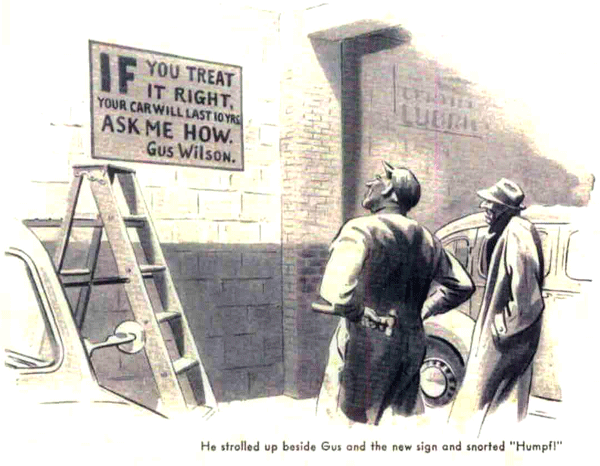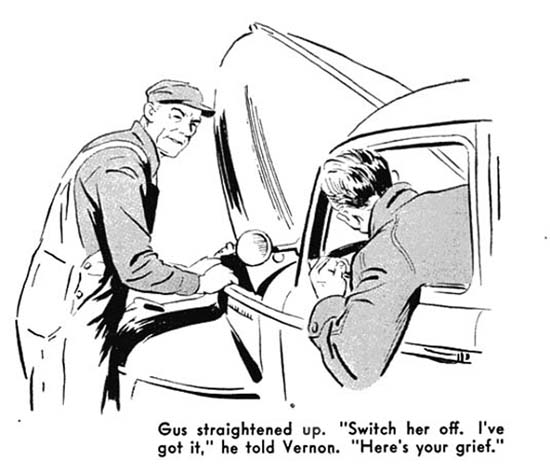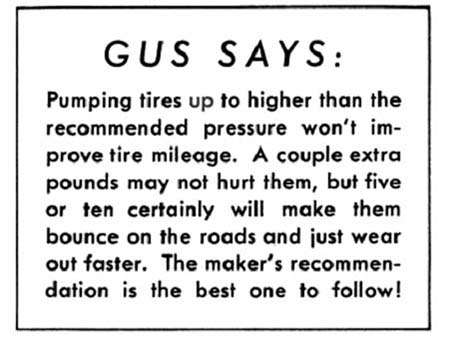July 1943
"GUS MAKES THEM LAST"
by Martin Bunn

Gus Wilson backed down off the stepladder and looked up at the sign he had just finished hanging on one of the walls of his Model Garage shop. Always a harsh judge of his own work, he admitted to himself that some of the lettering was a little crowded and that the net effect was not altogether professional. But in spite of any imperfections, he felt considerable satisfaction.
For a fellow who made no pretense of being an artist it was a creditable sign-painting job, and maybe it would needle up some of the customers who read it. Just to get the idea of how it would sound to others, Gus read it aloud to himself: "If you treat it right, your car will last 10 years. Ask me how. Gus Wilson."
A little puffed up with pride of authorship, he continued to gaze at the sign as he loaded up his pipe. Absent-mindedly, he put it back in his pocket again, unlit, and was still gazing when a blast of cold air hit the back of his neck. Then from behind him, there came a loud and disdainful "Humpff."
Gus spun around and saw Vernon Hopkins standing just inside the wide-open doors. Vernon always looks grouchy, but now the expression on his thin face was practically poisonous.
"Shut that door!" Gus barked disgustedly. "Isn't it bad enough to get an April day in June without having some sap leave the doors open and let all of outdoors into the shop? What the dickens are you snorting about, anyhow?"
Vernon didn't make any move to close the sliding door. Instead, he strolled up beside Gus looking at the new sign and snorted another "Humpff." Then he said: "Hooey!"
"What the devil do you mean -- hooey?"
Gus demanded indignantly. "What that sign says is the gospel truth. Any car built in the past ten years is good for ten years of satisfactory service if you treat it right."
"Yeah?" Vernon said. "I treat my car right, don't I?"
Gus had to admit that he does. He's one of the most careful owners on the Model Garage books.
"O.K.," Vernon said. "I'll show you why your sign is hooey."
He went out and a half minute later drove his car into the shop. Gus closed the doors behind it. When he had finished that chore he found Vernon leaning out of his sedan's window. "Listen," Vernon said.
Gus listened. From somewhere under the hood there came a steady thump --- thump --- thump.
Vernon speeded up the engine. The thumps still were there, but now they went thump - thump - thump -- closer together.
"All right," Gus said. "There's a noise under your hood. What of it? How does that make my sign out to be a liar?"
Vernon cut his engine and got out of the car. "Do you know what that noise is?" he demanded.
"No," Gus said. "Do you?"
"Yes," Vernon told him. "It's a loose connecting rod. This car is two years old. It's had the best of care. There's less than 20,000 on its clock. But it has started to go to pieces. Where'll it be eight years from now, I ask you? That's why I say your sign is hooey."
"Loose connecting rod, hey?" Gus said reflectively. "Turn that engine over again, will you?"
Vernon got back into his car and restarted the engine. Gus listened intently for a long minute. Then he shook his head. "It doesn't sound like a loose connecting rod to me," he said. "What makes you think that's what it is?"
"I had this bus in the biggest repair shop down in the city about two hours ago," Vernon told him. "Their expert made a check and said it's a loose connecting rod."
"It still doesn't sound like a connecting rod to me," Gus said. "Well, whatever it is, when did it first go wrong?"
Vernon scratched his head. "I've been thinking about that and I don't think I really know: it must have come on very gradually, I suppose."
"Now that's going to help me a lot," Gus said with a touch of sarcasm. "When's the last time you had trouble of any kind with your car?" he added. "Think back, now."
Vernon thought it over for a minute, then ventured: "I guess it was early in April. I read where you should save your antifreeze on account of it will be hard to get next winter, so I drained it all out of my radiator and block and put it away in glass jugs. That very night we had a return engagement with Old Man Winter and when I went to start my car next morning there was a terrific squealing noise up front. It turned out that just the water pump was frozen up, nothing else. I thawed out the water pump and the noise stopped and everything was O.K. after that. That's the last trouble -- if you can call it trouble -- I had with the car, until this morning."
"And what happened this morning?" Gus put in.
"About ten o'clock I had to make a rush trip down to the city. As soon as I got out on the highway I noticed a noise and was suddenly aware that it had been there some time, not so loud, but I'm sure it was there. That same thumping noise you just heard.
"After I'd finished what I had to do in the city I thought I'd better get the bus checked, so I took it into that big garage. They said that a connecting rod was loose and about to let go, and wanted me to leave the car there to have a new one installed. But I didn't want to make another trip down to the city just to get my car after they had fixed it, so I took a chance and drove it home. It ran all right and the noise wasn't much louder when I got here than it had been when I left the city. Well, what are you going to do about it?"
"The first thing I'm going to do," Gus told him, "is find out what really is the matter with your crate -- which is more than those 'experts' of yours down in the city did. I've got my ears, and they've turned in all the evidence I need that there isn't anything wrong with your connecting rods." He raised the hood. "Now you get in there and start your engine and keep it turning over slow -- not much faster than idling speed -- until I tell you to speed it up or to stop it."
Vernon got into the car and stepped on the starter. With the engine running slowly the thumping noise was noticeable. "Speed her up," Gus said. With the engine running faster the thumps were closer together and louder. "Slow her down," Gus said. "Just keep her turning over."
He stuck his head under the hood and put his keen ears and eyes to work. It didn't take him two seconds to locate the noise as coming from up front. Then his eyes caught a movement where there shouldn't have been any movement. The generator was loose on its mounting and at every turn of the fan belt, it was jumping up and down.
Gus straightened up, "Switch her off. I've got it," he told Vernon.
He examined the V-type fan belt closely. In one place, for about six inches, it was worn down considerably. Gus stood looking at the worn spot for the better part of a minute.
Then he grinned. "Here's your grief," he said.
Vernon stared at the engine. I don't see anything wrong," he said.
Gus pointed out the worn spot in the fan belt. Then he moved the generator with a finger. "Every time that worn-down place in the belt gets around to the generator," he explained, "it makes the generator jump on its mounting, causing a thump. Instead of a new connecting rod; all you need is a new fan belt and a tightening-up job on that generator."
Vernon grinned unwillingly. "That doesn't make me sore," he admitted. "Go ahead and fix her up. But there's one thing that I don't get yet. What made the belt wear down like that in that particular spot? The rest of it looks as good as new."
"It happened when the pump froze last April," Gus said. "When you started your engine that morning, your water pump was frozen up so tight that the fan belt couldn't turn it over. So what happened was that your engine turned the crankshaft pulley, but the belt couldn't operate because the pump wouldn't turn. The revolving pulley wore the stationary belt down at the place where they were in contact.
"As you said yourself, there's been a little noise there -- probably ever since. Finally, the vibration worked the generator mounting bolts loose. When the generator really began to bounce because of that worn spot and because it was loose -- that just happened this morning -- you really heard a loud noise. Get it?"
"Just my luck!" Vernon gloomed. "First time I ever heard of anyone having any serious trouble with a fan belt."
"So?" Gus said, "Well, lots of people have trouble with them, and sometimes it's serious trouble. What I'm trying to impress on all the people who bring their cars in here is that if they want to get the most out of them they should consider any trouble serious.
"Mrs. Miller came in one day last week scared half to death by a squealing noise she'd heard coming from somewhere under her hood -- she thought her engine was shot all to blazes and she was in a dither because she wouldn't be able to get another car until after the Axis has been licked. There was a loud squeal, all right, but it was caused by a glazed fan belt doing a little slipping.
"That was only a little thing, but I was glad that she had brought her car in because we've got to take care of all the little things before they have a chance to grow into big ones. A slipping belt or one that is too loose, doesn't rotate the fan fast enough to draw in sufficient cool air for efficient cooling: that causes the engine to overheat, and overheating isn't good for an engine. A belt that is too tight is as bad as one that isn't tight enough -- it is likely to pull the water pump impeller shaft out of alignment and cause excessive wear or the pump bearings, and eventually to make the pump leak."
"I suppose you're right," Vernon said grudgingly. "But how the dickens can you tell when your fan belt is about to go bad?"
"By using your eyes," Gus told him:
"Take a look at your belt every month or so.
"Usually a fan belt is good for at least 15,000 miles, but now and then something makes one go bad suddenly -- like yours did. A belt that shows the slightest indication of shredding should be replaced. A fan belt that breaks while you're driving can cause a lot of trouble. I know, because I've had it happen to me."
"Charge me up with a spare belt. I'll keep it in the car. Maybe there's some truth in that sign of yours, after all."
Gus grinned. "It's all truth!" he maintained. "There are eight years more of good driving in this bus of yours -- if you treat it right!"
END
L. Osbone 2019

